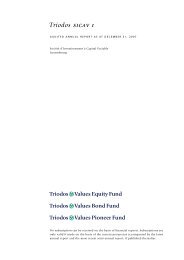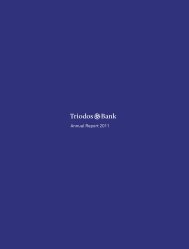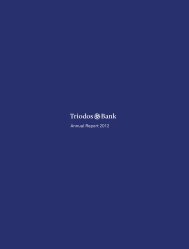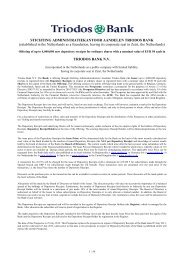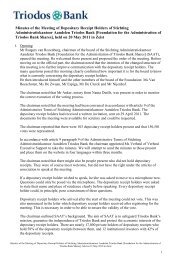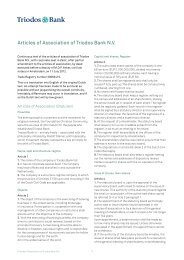TlB Annual Report 2009 - Triodos Bank
TlB Annual Report 2009 - Triodos Bank
TlB Annual Report 2009 - Triodos Bank
Create successful ePaper yourself
Turn your PDF publications into a flip-book with our unique Google optimized e-Paper software.
The <strong>Bank</strong>’s interest rate risk remained within the<br />
internally determined risk appetite through out<br />
<strong>2009</strong>.<br />
LIQUIDITY RISK<br />
Liquidity risk refers to the risk that the <strong>Bank</strong><br />
may be unable to release sufficient funds to<br />
fulfil its obligations to its customers at a<br />
particular point in time. Funds entrusted are<br />
attracted for the <strong>Bank</strong>’s lending operations. The<br />
surplus is invested at other financial institutions<br />
on short term deposits or government (and<br />
governmental guaranteed) bonds. <strong>Triodos</strong><br />
<strong>Bank</strong>’s policy is to have sufficient funds<br />
avail able so it can meet its obligations at all<br />
times. <strong>Triodos</strong> <strong>Bank</strong> is characterised by a high<br />
degree of liquidity, and is funded entirely by<br />
saving deposits from private and corporate<br />
customers and equity. As a result, the <strong>Bank</strong><br />
does not need to rely on funding from the<br />
interbank money markets, and was not affected<br />
by the challenge these markets faced during the<br />
recent financial crisis (for its funding). The<br />
<strong>Bank</strong> nevertheless prepared a Liquidity Contingency<br />
Plan. The plan outlines the actions that<br />
can be taken to increase our liquidity positions<br />
in the case of a liquidity crisis. The <strong>Bank</strong>’s<br />
liquidity risk remained within the internally<br />
agreed policy norms throughout <strong>2009</strong>.<br />
STRATEGIC AND REPUTATION RISK<br />
<strong>Triodos</strong> <strong>Bank</strong> has a clearly defined mission derived<br />
from its articles of association and works<br />
according to the values that are described in its<br />
business principles. Within the organisation,<br />
there is a lot of investment in co-workers’<br />
training, awareness raising and involvement<br />
with the topics and principles that are most<br />
important to the <strong>Bank</strong>. The <strong>Bank</strong>’s reputation is<br />
a strategic pillar, as confidence in <strong>Triodos</strong> <strong>Bank</strong><br />
is vital to its provision of services. The <strong>Bank</strong>’s<br />
reputation is very important, so any risks to it<br />
are managed very carefully. This includes<br />
training of co-workers, reporting all related<br />
activities as transparently as possible, and carefully<br />
choosing partners for collaboration. In<br />
times of crisis, <strong>Triodos</strong> <strong>Bank</strong>’s aim is to provide<br />
timely and accurate information and to actively<br />
communicate on any issues.<br />
BASEL II<br />
<strong>Triodos</strong> <strong>Bank</strong> implemented the Basel ii capital<br />
framework of the Basel Committee on <strong>Bank</strong>ing<br />
Supervision on 1 January 2008 and since this<br />
date reports according to the requirements<br />
stipulated by Basel ii. Basel ii has different<br />
approaches to the implementation of requirements<br />
regarding credit, market and operational<br />
risks. In view of its size and stage of development,<br />
<strong>Triodos</strong> <strong>Bank</strong> has currently opted to<br />
implement the less advanced methods under<br />
Pillar i of Basel ii. The Standard Approach for<br />
assigning capital is used to calculate credit risks<br />
and market risk. The Basic Indicator Approach<br />
is used to calculate the capital requirements for<br />
operational risks. The options chosen by <strong>Triodos</strong><br />
will not diminish its efforts to continue to<br />
improve and fine-tune its internal risk management<br />
system. The revised framework supports<br />
future developments of more advanced capital<br />
calculation methodologies. As part of Pillar ii<br />
of Basel ii, <strong>Triodos</strong> <strong>Bank</strong> also implemented the<br />
Internal Capital Adequacy Assessment Process<br />
(icaap). The icaap is used for the supervisory<br />
review as part of Pillar ii requirements. This<br />
capital policy was discussed with the Dutch<br />
Central <strong>Bank</strong> (dnb), which made a number of<br />
recommendations that were followed up within<br />
the organisation. Pillar iii concerns the disclosure<br />
of solvency risks. The purpose is to make<br />
data on solvency and the connected risk profile<br />
of the organisation available to stakeholders.<br />
In line with regulations, this data is published<br />
where desirable or necessary.<br />
CAPITAL MANAGEMENT<br />
The aim of capital management is to guarantee<br />
that sufficient capital is available to meet <strong>Triodos</strong><br />
<strong>Bank</strong>’s capital needs, given its underlying<br />
business strategy. The Asset and Liability<br />
Committee manages the capital within the <strong>Bank</strong>.<br />
The strategic objectives determine <strong>Triodos</strong><br />
<strong>Bank</strong>’s Risk Appetite, or its willingness to take<br />
risks. Risk appetite indicates the maximum risk<br />
that <strong>Triodos</strong> <strong>Bank</strong> considers acceptable to<br />
implement its business strategy in order to<br />
protect itself against events that could have an<br />
adverse effect on profitability, liability capital<br />
and the depository receipt price. Capital serves<br />
as the buffer to absorb the impact of losses that<br />
are inherent to the business. Risk is an important<br />
element of the capital framework. One of<br />
the yardsticks for expressing and quantifying<br />
58 TRIODOS BANK - ANNUAL REPORT <strong>2009</strong>




